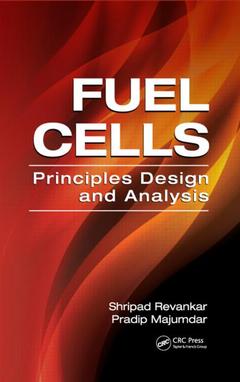Fuel Cells Principles, Design, and Analysis Mechanical and Aerospace Engineering Series
Auteurs : Revankar Shripad T., Majumdar Pradip

Fuel Cells: Principles, Design, and Analysis considers the latest advances in fuel cell system development and deployment, and was written with engineering and science students in mind. This book provides readers with the fundamentals of fuel cell operation and design, and incorporates techniques and methods designed to analyze different fuel cell systems. It builds on three main themes: basic principles, analysis, and design.
The section on basic principles contains background information on fuel cells, including fundamental principles such as electrochemistry, thermodynamics, and kinetics of fuel cell reactions as well as mass and heat transfer in fuel cells. The section on design explores important characteristics associated with various fuel cell components, electrodes, electrocatalysts, and electrolytes, while the section on analysis examines phenomena characterization and modeling both at the component and system levels.
- Includes objectives and a summary in each chapter
- Presents examples and problems demonstrating theory/principle applications
- Provides case studies on fuel cell analysis
- Contains mathematical methods including numerical methods and MATLAB® Simulink® techniques
- Offers references and material for further reading
Fuel Cells: Principles, Design, and Analysis
Introduction. Review of Electrochemistry. Review of Thermodynamics. Thermodynamics of Electrochemical Fuel Cell. Electrochemical Kinetics. Charge Transport in Fuel Cell. Fuel Cell Characterization. Fuel cell Components and Design. Heat and Mass Transport in Fuel Cell. Gas Flow Channel Analysis and Design. Computational Model for Analysis and Design of Fuel Cell. Dynamic Simulation and Fuel Cell Control System. Fuel Cell Power Generation Systems. Fuel Cell Application, Codes and Standards, and Environmental Effects.
Shripad T. Revankar is a professor of nuclear engineering at Purdue University, West Lafayette, Indiana, and visiting professor at POSTECH, South Korea, in the Division of Advanced Nuclear Engineering. He received his MSc (1977), PhD (1983) in physics from Karnataka University, India, and M.Eng. (1982) in nuclear engineering from McMaster University Canada. He has published more than 300 refereed research papers in journal and conferences, is editor-in-chief of Frontier Energy-Nuclear Energy, serves on the editorial boards of eight international journals including Heat Transfer Engineering, ASME Journal of Fuel Cell Science and Technology, and is also an ASME Fellow and winner of several awards.
Pradip Majumdar
is a professor and chair of mechanical engineering, and the director of the Heat and Mass Transfer Laboratory in the Department of Mechanical Engineering, Northern Illinois University, DeKalb, Illinois. He received his BS degree (1975) in mechanical engineering from B.E College, University of Calcutta, and MS (1980) and PhD (1986) degrees in mechanical engineering from Illinois Institute of Technology, Chicago. He has worked on a number of federal and industrial research projects and published over 100 refereed research papers in archival journals and conference proceedings. He serves as the editor-in-chief of the Transactions of Fluid Mechanics, International Journal.Date de parution : 06-2014
Ouvrage de 704 p.
15.6x23.4 cm
Thèmes de Fuel Cells :
Mots-clés :
Fuel Cell; PEM Fuel Cell; Primary Energy Sources; Gas Diffusion Layer; Fossil Fuel; Bipolar Plate; Renewable Energy Resources; Fuel Cell Stack; Alternative Energy Systems; Electrode Electrolyte Interface; Electrochemical Device; Fuel Cell Power System; Electrochemistry; Proton Exchange Membrane Fuel Cell; Electrolysis Cell; Fuel Cell System; Oxidation; Polymer Electrolyte Membrane; Reduction Processes; Gas Flow Channels; Faraday’s Laws; Gas Concentration Distribution; Ideal Polarized Electrode; Gibbs Function; Polarization; Mass Transfer Losses; Conductivity; Equivalent Circuit; Ohm’s Law; Butler Volmer Equation; Mass Transport; Gas Channel; Nernst–Planck Equation; Convective Mass Transfer Coefficient; Cyclic Voltammetry; Consumption Rate; Thermodynamics; YSZ Electrolyte; Enthalpy; Area Specific Resistance; Entropy; PEMFC; Gibbs Function for Ideal Gases; PEM Electrolyzer; Combustion Process; Microbial Fuel Cells; Tafel Equation; Hydrogen Oxygen Fuel Cell; Bipolar Plate Design; Gas Flow Field; Nomenclature



